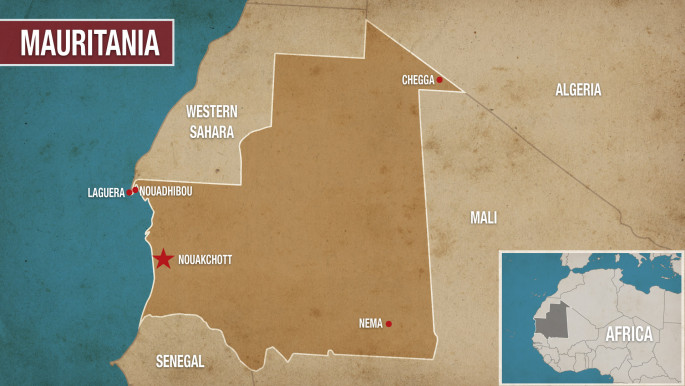Mauritania's Algeria alliance leaves Morocco out in the cold
In-depth: Nouakchott's diplomats seek to balance economic relations with Algeria and Morocco while becoming a hub for strategic dialogue.
4 min read
Mauritania's PM Hademine (left) told Algeria's Abdelmalek Sellal that cooperation had stabilised the region [Getty]
Rising tensions between Morocco and Mauritania - after the Mauritanian Army rose its flag on a strip of land bordering Laguera province in Western Sahara - have brought Mauritania's alliance with Algeria into focus.
On December 20, Algeria's Prime Minister Abdelmalek Sellal announced the reopening of an Algerian border crossing with Mauritania during a session of the High Joint Algerian-Mauritanian Committee.
Mauritanian Prime Minister Yahya Ould Hademine met the Algerian president before attending that mini-summit, to praise the bilateral cooperation between the two neighbours.
"Security and military coordination between Mauritania and Algeria has largely contributed to stability in the sub-region," Yahya said in Algiers.
The warming relations appears to have made Rabat review its relations with Nouakchott. Hamid Chabat, head of Morocco's conservative Istiglal party, even pronounced that "Mauritania is a historical integral part of Morocco".
Mauritania's governing party, The Union for The Republic, responded with an angry statement to demand an immediate apology from the Moroccan government, which seized the opportunity to denounce Chabat's claims.
 |
Officials from Rabat went on to pay a visit to Mauritania's northern town of Zouerate, where Moroccan Prime Minister Abdelilah Benkirane met with Mauritania's Foreign Minister Isselkou Ould Ahmed Izid Bih, not far from President Mohamed Ould Abdelaziz's annual vacation spot.
Some observers saw this as a warning from Abdelaziz that Morocco should respect Mauritania's independence.
 |
Aziz received Benkirane in Zouerate to show the Moroccan kingdom that Mauritania is a sovereign state |  |
"Aziz received Benkirane in Zouerate to show the Moroccan kingdom that Mauritania is a sovereign state," Muhamadu Taleb, a Mauritanian resident of the town, told The New Arab.
While Mauritania goes through this bout of regional jostling, there are a limited number of factors that can determine its future political approach. Surrounding the Chegga border with Algeria there lies a vast desert land that occupies most of the Mauritanian map.
The eastern half of Mauritania has been suffering for centuries from a lack of a infrastructure, with most of its residents living as desert nomads. Abdelaziz has won the two late presidential terms based on his slogan as "president of the poor".
 |
We cannot afford gasoline for cars, so we sometimes prefer riding camels, even for long distances |  |
The title gave him popular support, and any chance to enhance this reputation with new Algerian investment is likely to be taken advantage of, especially since oil prices have been suffering a major decline. This could strengthen Mauritania's position in requesting exceptional backing from Algeria to invest in the impoverished Mauritanian East.
"We cannot afford gasoline for cars, so we sometimes prefer riding camels, even for long distances," Yeslek Ahmadan who lives in Nema, south-eastern Mauritania, told The New Arab.
Algeria, meanwhile, is one of the world's top 20 oil exporters.
While this indicates Eastern Mauritania is in need of Algerian investment, the Western half of the country has been heavily dependant on exports from Morocco. Moroccan agricultural products in particular have dominated food imports in West Mauritania.
| Comment: Morocco must rekindle relations with Mauritania |
Every day, dozens of Moroccan trucks enter Nouadhibou, the second largest city in Mauritania, and one which borders the aforementioned Laguera province of Western Sahara, which is claimed by Morocco. The trucks are stuffed full of all kinds of vegetables.
"Moroccan farmers provide us with most of what we sell here," said Ahmadu Sidi Mohamed, a grocery store owner in Nouadhibou.
Walking this tightrope between dependency on Morocco and Algeria, Abdelaziz has been attempting to promote Mauritania's own economic interest. Following the closing of the Algerian border in 2014, this latest diplomatic move has managed to break the ice in the Sahara.
And in Morocco, the Mauritanian administration's sharp rebuke of Chabat's provocation has forced the Moroccan kingdom to opt for a friendly solution. Rabat also reportedly requires Mauritania's support for a new oil pipeline.
Abdelaziz's next challenge is to exploit this latest competition over Mauritania into significant investment opportunities for the people of his country by making Mauritania a regional strategic pivot for much of North African development.
Habibulah Mohamed Lamin is an independent journalist based in the Sahrawi refugee camps, Southwestern Algeria. Follow him on Twitter: @habibullahWS





 Follow the Middle East's top stories in English at The New Arab on Google News
Follow the Middle East's top stories in English at The New Arab on Google News


